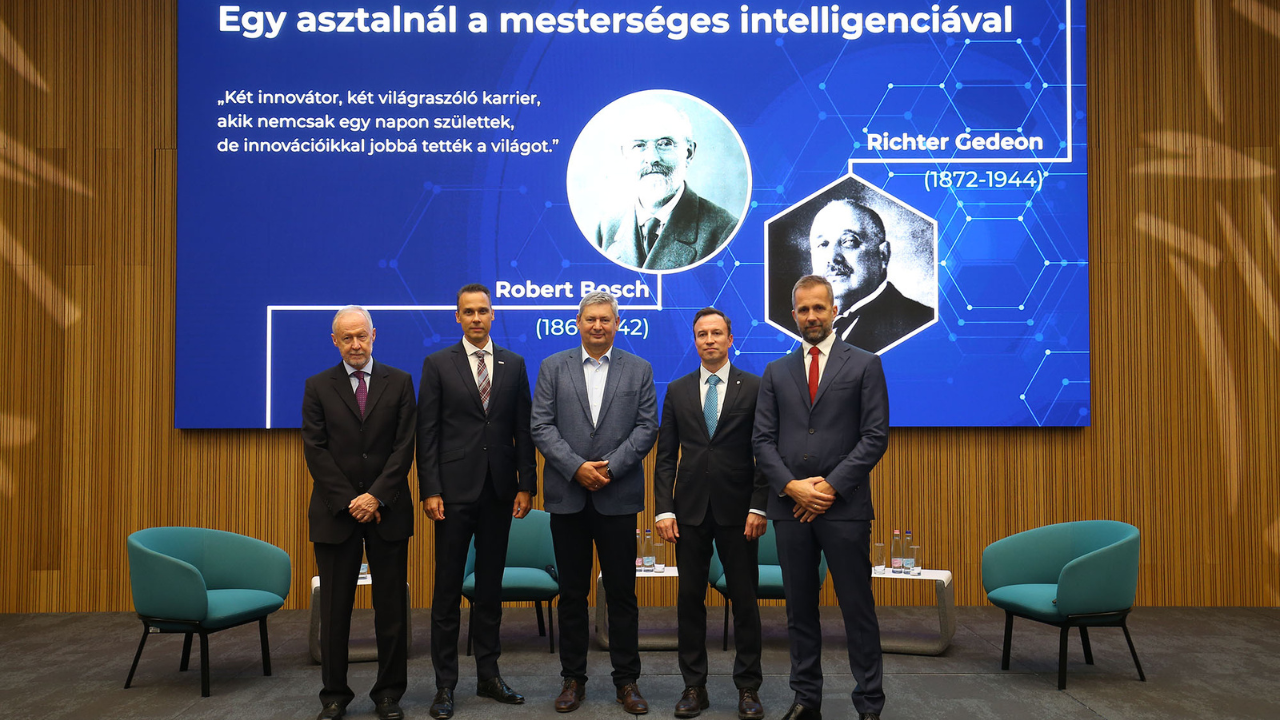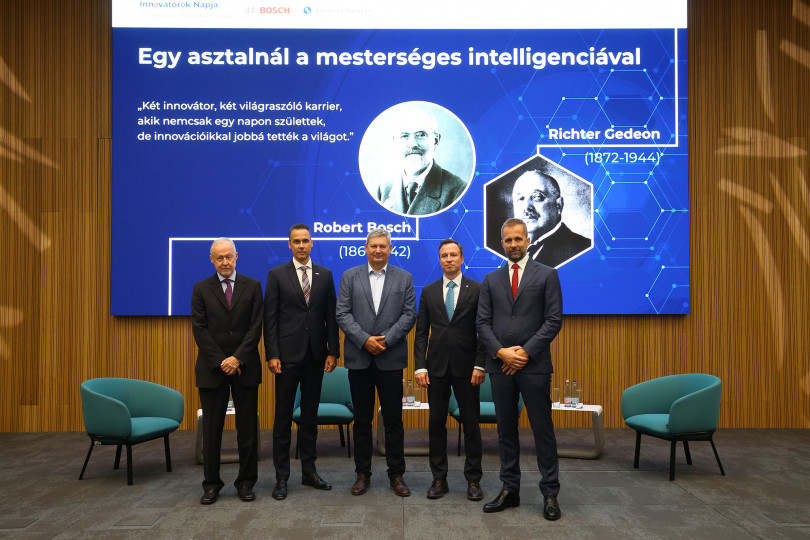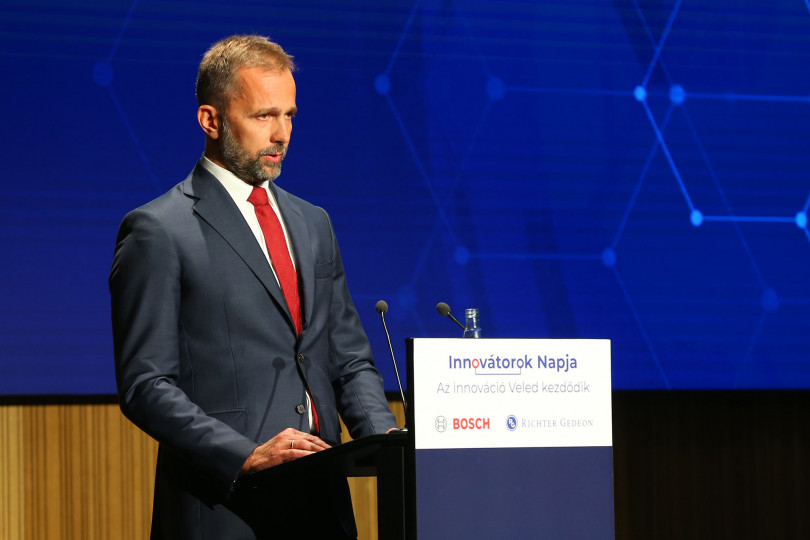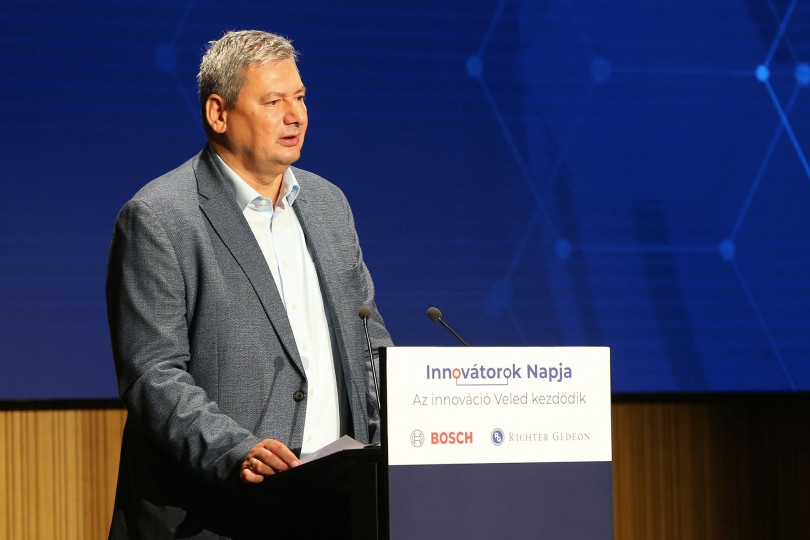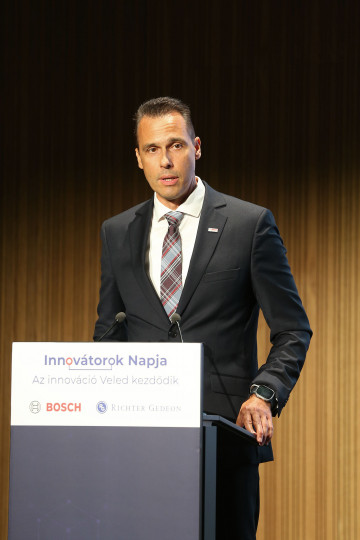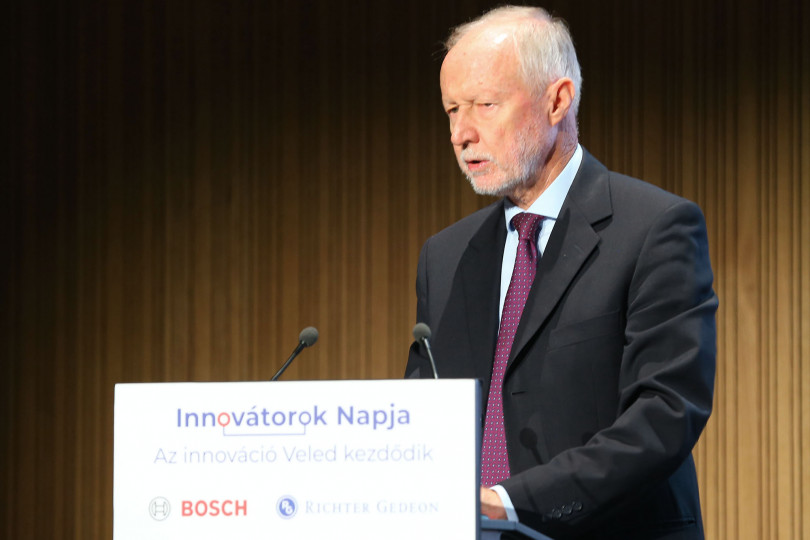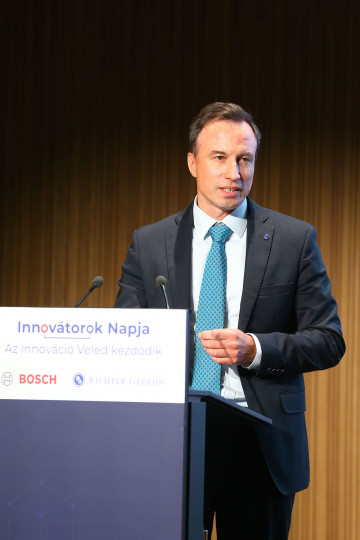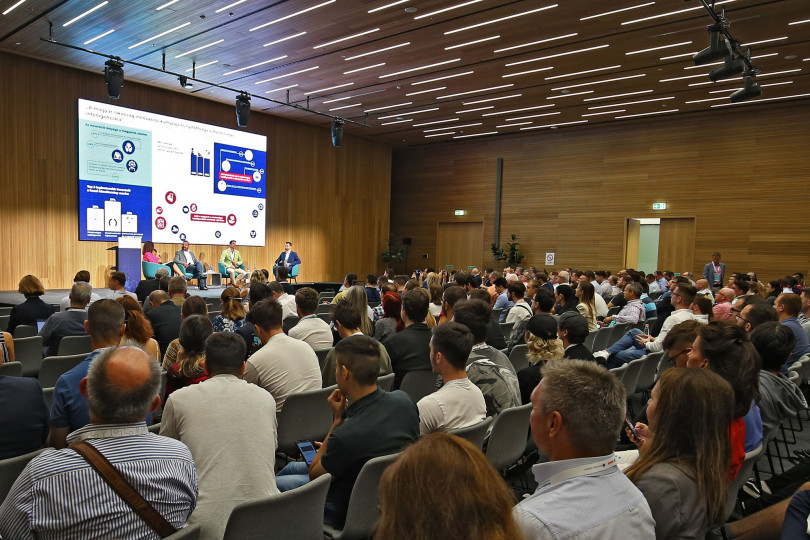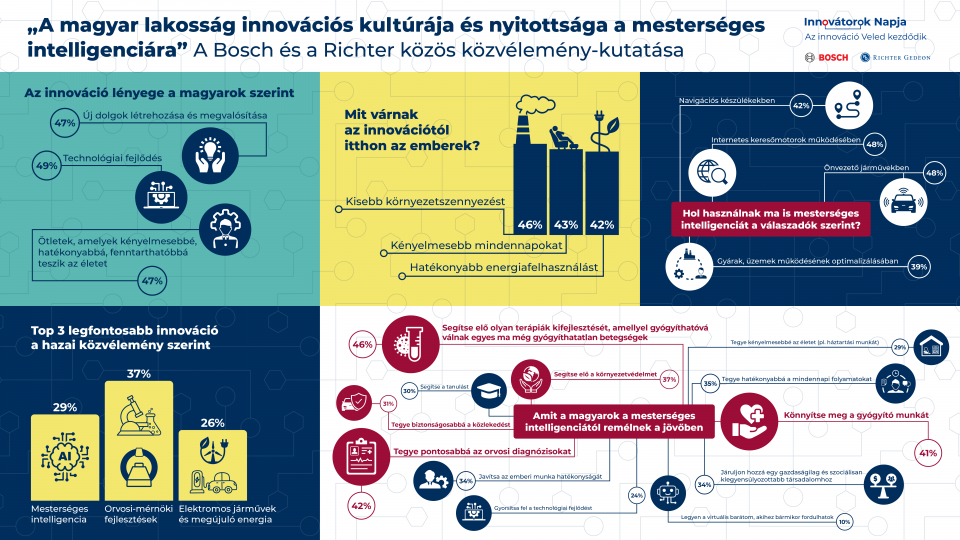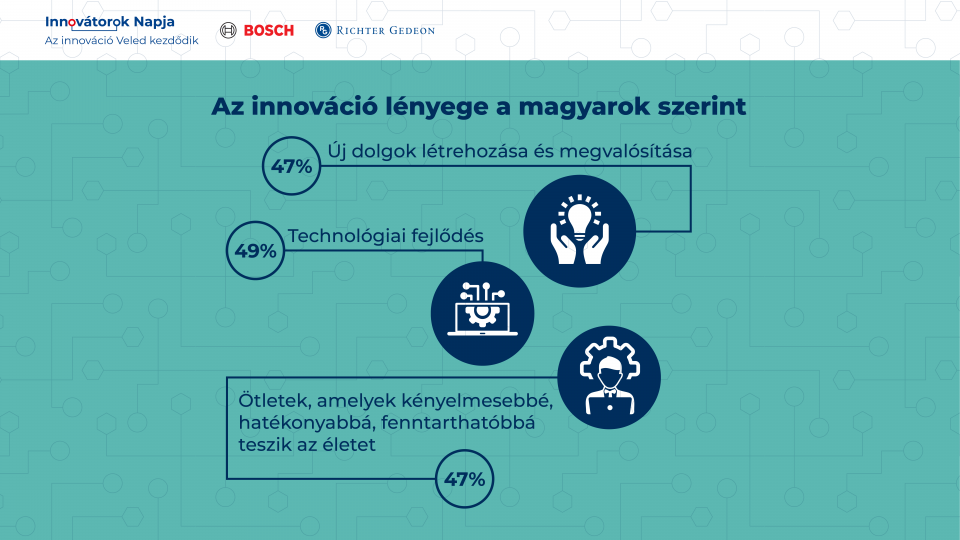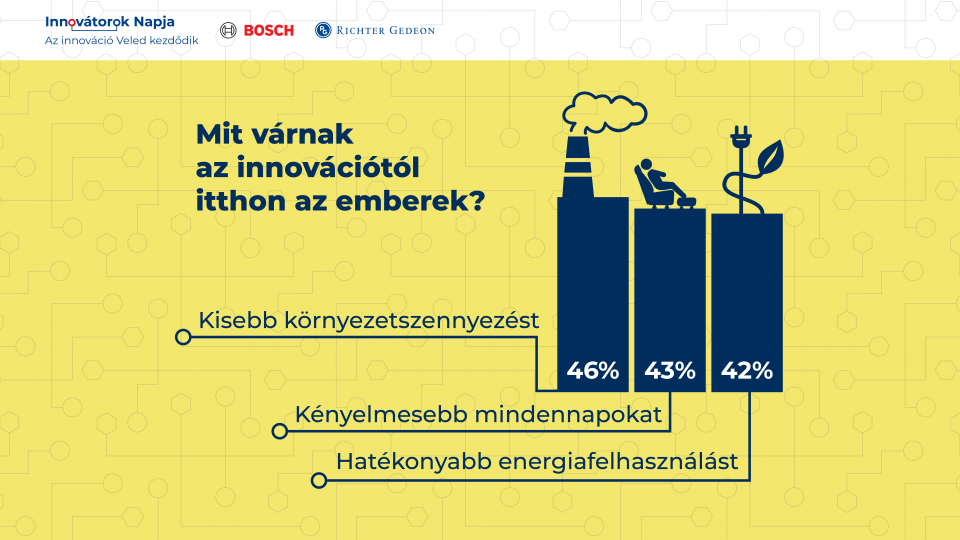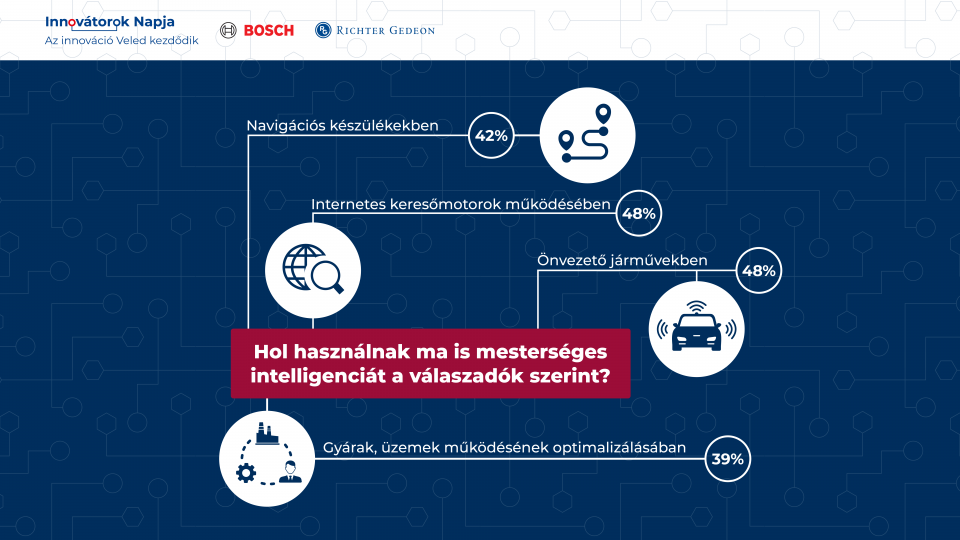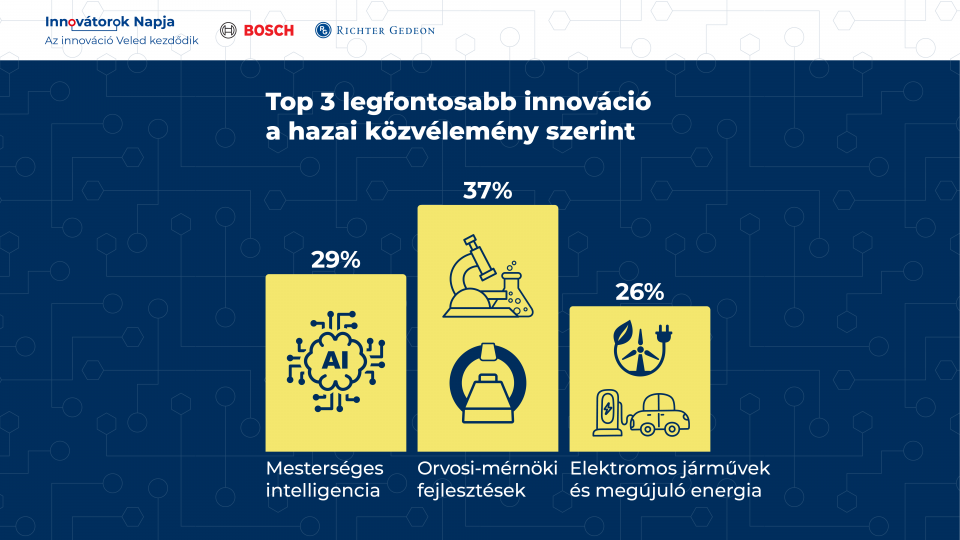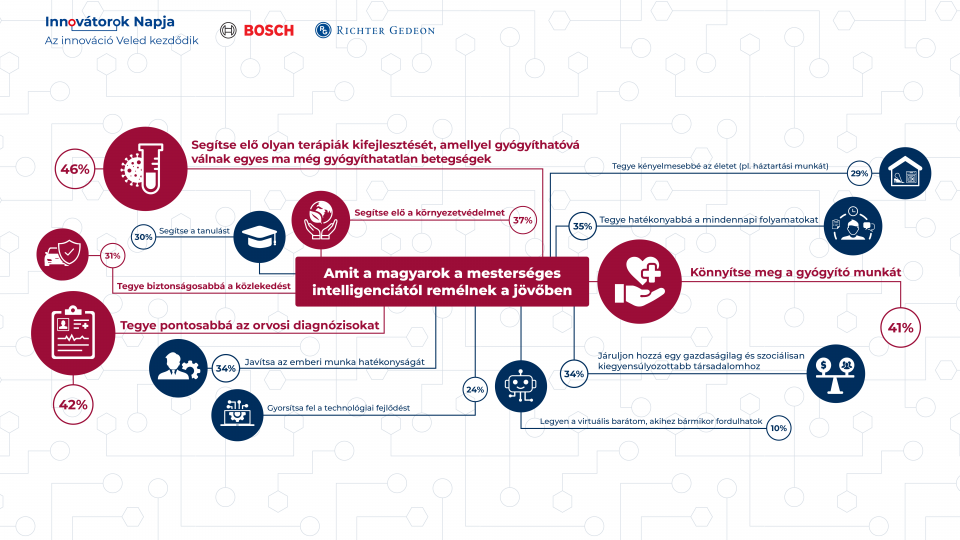Innovations make life better: environment, energy, comfort
Technological development has been part of our lives for quite some time, and we have benefited from its achievements widely. This is confirmed by the joint survey from Bosch and Richter, which concludes that nearly two-thirds of Hungarians think positively about innovations (63 percent), and almost no-one (2 percent) in Hungary would challenge the merits of innovation. Today, innovative developments are deemed to have three key missions: to mitigate environmental pollution (46 percent), to enhance more efficient energy use (42 percent), as well as to serve the purpose of making everyday life more comfortable (43 percent). Bosch and Richter agree that combating climate change is the biggest task of our age. People are, therefore, right to expect companies to provide technical solutions to these issues.
Industrial use of AI in automotive, manufacturing, and healthcare
Most people think of today’s professional application of artificial intelligence as being behind internet search engines (48 percent), vehicles’ self-driving (48 percent), navigation devices (42 percent), and optimising the operation of factories (39 percent). On the other hand, it is less obvious to people that AI is already present in the design of medical equipments (39 percent), in security solutions (29 percent), in the development of medicines, and vaccines (27 percent) or in the regulation of energy supply (21 percent). Well ahead of expectations, Bosch and Richter have been investing in the development and expansion of promising new technologies.
Artificial intelligence in everyday life
What would people use artificial intelligence for in everyday life? As is the case today, respondents use or would prefer to use AI solutions for general information search (84 percent). This is obviously linked to the ChatGPT boom of recent times, and can be the underlying reason behind the fact that many people would use AI to facilitate their daily work (66 percent). There is also a significant proportion of those who would involve artificial intelligence in the diagnosis of diseases in the field of healthcare (66 percent).
Future of AI – from medical therapies to safe transport
Most people hope that AI will contribute to the development of a therapy for today’s incurable diseases (46 percent). Making medical diagnoses more accurate (42 percent) and a general facilitation of cure and healing (41 percent) are also among the main goals. There are many who expect artificial intelligence to help make progress in environmental protection (37 percent), to improve the efficiency of human work (34 percent), and make traffic safer (31 percent).These are the areas in which Richter and Bosch are playing a significant role in solving societal challenges through continuous innovation and the increasing use of artificial intelligence.
Trust in artificial intelligence
Although Hungarians in general are widely trusting in technology and innovations, artificial intelligence leaves some question marks for the respondents at the moment. While more than half of them (54 percent) are unsure about the future use of artificial intelligence, those who are confident in AI and see it useful (27 percent) outweigh the sceptics (19 percent). Being aware that concerns can arise against less well-known new technologies, both Bosch and Richter are committed to reinforce trust in artificial intelligence.
Richter innovations for the quality of life
Boasting the largest pharmaceutical R&D base in Central Europe, Gedeon Richter is committed to improve health and quality of life through its innovative products. In the field of original research the company focuses its efforts on developing therapies for unmet medical needs in neuropsychiatry. Besides, it is continuously looking for new, innovative therapeutic solutions for the most common gynecological conditions. With its biotechnological and generic product development it strives to improve access to high-added value, affordable medicines.
The company is also committed to employ AI solutions to improve the efficacy of its R&D and production processes.
Bosch takes AI to the next level
Bosch, in the research and application of AI, focuses on sustainability, mobility, and Industry 4.0, and continues to set the pace in the use of artificial intelligence. In the past five years, the company has filed patent applications for more than 1,000 AI inventions, making it one of the leading applicants for AI patents in Europe. At Bosch, AI experts are currently working on well over 60 specific applications that new AI models offer for the company, e.g., an in-house version of generative AI platform that grants access to a wide variety of data sources.
Bosch, as a leader in the field of automotive technologies, is committed to development of intelligent safety solutions for vehicles and transport, to help people in their everyday lives and addressing user expectations already today. Also, Bosch is tackling the sustainability challenge and is firmly committed to promising technologies such as hydrogen electrolysis.
Bosch has developed its own Code of Ethics for AI, a guideline governing the use of AI in Bosch products. This ethical approach combines a quest for innovation with a sense of social responsibility.
Bosch×Richter Innovators Day – trend-setting corporate collaboration
It was the first time for Hungary’s two leading innovative companies, namely the Hungarian Bosch Group and Richter Gedeon Nyrt, to organise a joint conference, titled “Bosch×Richter Innovators Day — At one table with artificial intelligence.” The founders of Bosch Group and Richter Gedeon Nyrt are inspirations for current and future generations.
“Climate change, limited resources, changing mobility patterns are all complex problems that require comprehensive innovative responses. In line with people’s expectation we, at Bosch, work every day on making the world better, sustainable, and safer by our innovative technologies, including artificial intelligence. To do this, we need partners with whom we share values and goals, because we strongly believe that together we can do more,” said Dr. István Szászi, Representative of the Bosch Group in Hungary and the Adriatic region.
”The more than 120 years development of Gedeon Richter shows that collaboration with partners leads to the most powerful innovations, the biggest scientific and business success. The founder of our company was also active in partnering up with other companies, and this attitude continues to characterize the company of today. Without an excellent partner, our original antipsychotic molecule wouldn’t have been able to became the 34th best sold drug in the US market either. We believe that initating a public discussion on current innovation trends that shape our future is more impactful if we join forces with other company, therefore it is our pleasure that Bosch and Richter became partners in this endeavour,” said Gábor Orbán, CEO of Richter Gedeon Nyrt.
Research methodology
The survey entitled “Innovation culture and openness of Hungarians to artificial intelligence” was conducted by the NRC in August 2023 on behalf of Richter Gedeon Nyrt and the Bosch Group in Hungary. The target group of the quantitative research comprised Hungarian residents in the age-group 18 to 65. Sample size: 1,000 people. Method of data collection: online questionnaire survey with multi-stratified, random sampling using the NRC Netpanel, Hungary’s largest research panel. The sample is representative based on gender, age group, education, type of residence and the characteristics of the region.
Zita Hella Varga
Phone: +36 70 667-6374
Bosch has been present in Hungary since 1898 with its products. After its re-establishment as a regional trading company in 1991, Bosch has grown into one of Hungary’s largest foreign industrial employers with currently eight subsidiaries. In fiscal 2022 it had total net sales of 2.255 billion forints and consolidated sales to third parties on the Hungarian market of 314 billion forints. The Bosch Group in Hungary employs more than 18,300 associates (as of December 31, 2022). In addition to its manufacturing, commercial and development business, Bosch has a network of sales and service operations that covers the entire country.
The Bosch Group is a leading global supplier of technology and services. It employs roughly 421,000 associates worldwide (as of December 31, 2022). The company generated sales of 88.2 billion euros in 2022. Its operations are divided into four business sectors: Mobility Solutions, Industrial Technology, Consumer Goods, and Energy and Building Technology. As a leading IoT provider, Bosch offers innovative solutions for smart homes, Industry 4.0, and connected mobility. Bosch is pursuing a vision of mobility that is sustainable, safe, and exciting. It uses its expertise in sensor technology, software, and services, as well as its own IoT cloud, to offer its customers connected, cross-domain solutions from a single source. The Bosch Group’s strategic objective is to facilitate connected living with products and solutions that either contain artificial intelligence (AI) or have been developed or manufactured with its help. Bosch improves quality of life worldwide with products and services that are innovative and spark enthusiasm. In short, Bosch creates technology that is “Invented for life.” The Bosch Group comprises Robert Bosch GmbH and its roughly 470 subsidiary and regional companies in over 60 countries. Including sales and service partners, Bosch’s global manufacturing, engineering, and sales network covers nearly every country in the world. With its more than 400 locations worldwide, the Bosch Group has been carbon neutral since the first quarter of 2020. The basis for the company’s future growth is its innovative strength. At 136 locations across the globe, Bosch employs some 85,500 associates in research and development, of which nearly 44,000 are software engineers.
Additional information is available online at www.bosch.hu, iot.boschblog.hu, www.bosch.com, www.iot.bosch.com, www.bosch-press.com, www.twitter.com/BoschPresse
About Richter
Gedeon Richter Plc. (www.gedeonrichter.com), Headquartered in Budapest/Hungary, it is a major pharmaceutical company in Central Eastern Europe, with an expanding direct presence in Western Europe, China, Latin America, and Australia. Having reached a market capitalization of EUR 3.9 billion (USD 4.1 billion) by the end of 2022, Richter's consolidated sales were approximately EUR 2.0 billion (USD 2.1 billion) during the same year. The product portfolio of Richter covers many important therapeutic areas, including Women's Healthcare, Central Nervous System, and Cardiovascular areas. Having the largest R&D unit in Central Eastern Europe, Richter's original research activity focuses on CNS disorders. With its widely acknowledged steroid chemistry expertise, Richter is a significant player in the Women's Healthcare field worldwide. Richter is also active in biosimilar product development.
For more information:
Zsuzsa Beke: +36 1 431 4888

